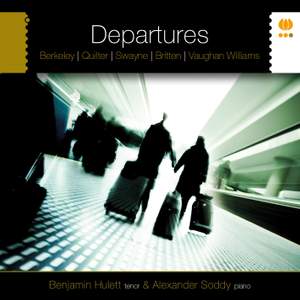Travelling is part of human nature: ever since our first steps out of Africa travel is a source of inspiration for many. It is also the theme of the new cd of the British tenor Benjamin Hulett, who made a personal choice from the works of British composers and also commissioned ‘Joys of Travel’ by Giles Swayne, performed here as a world premiere.
The young British tenor Benjamin Hulett makes a very powerful statement with this new album. He uses the term ‘Departures’ in several ways: the start of a journey, the cd as a new beginning for him and pianist Alexander Soddy. Another meaning is found in the theme of the composer setting texts in a language not his own – a linguistic departure.
This combination of repertoire and theme is new and daring. Hulett also commissioned a new work to complete the theme of the programme.' The Joys of Travel Op. 124' was composed in 2009 by the British composer Giles Swayne and is performed here as world premiere.
Hulett’s strongpoint, apart from his impressive vocal qualities, is the way he brings together the various works in an organic sounding programme. Together with pianist Alexander Soddy, with whom he has an obvious close musical relationship, he forms a remarkably harmonious and balanced duo.
‘For my university recital I put together a programme called ‘An Englishman Abroad’. The concept was simple: to feature some works by English composers written in languages other than their own. Ten years later it dawned on me that I was the Englishman abroad as I was living in Germany and singing at the Hamburgische Staatsoper. Together with one of the other Englishmen at the opera, the fine conductor Alex Soddy, in whose house conducting debut I had participated as Tamino, we refined the programme and embraced the notion not only of language, but of the act of travelling itself.
As two young musicians we also felt that the opportunity to record and perform this programme was a new beginning in our lives. A departure, if you will. The title found us and the more we began to embark on our new journeys, the more apt it became.’ (Benjamin Hulett)



